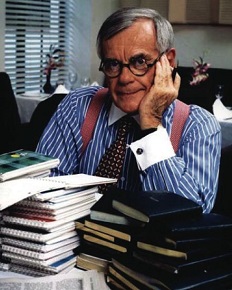De Amerikaanse schrijver, journalist en filmproducent Dominick Dunne werd geboren 29 oktober 1925 in Hartford, Connecticut. Dunne was een van de zes kinderen uit een rijke familie. Zijn vader Edwin Richard Dunne was chef-arts in een kliniek en een bekend cardioloog. Een van zijn broers was de schrijver John Gregory Dunne. Na zijn studie aan de Universiteit van Williams, diende hij als een soldaat in WO II. Na een professionele start bij de televisie produceerde hij een aantal films: 1970 The Boys in the Band, 1971 The Panic in Needle Park met Al Pacino 1972 Play As It Lays en 1973 Ash Wednesday, met Elizabeth Taylor en Henry Fonda. Alcoholisme en drugsgebruik maakten een einde aan zijn carrière als filmproducent. Een persoonlijk drama gaf de impuls voor zijn tweede carrière: In 1982 werd zijn 22-jarige dochter, de actrice Dominique Dunne, gewurgd door haar minnaar. Tina Brown, toen hoofdredacteur van Vanity Fair, stelde hem voor om voor het tijdschrift over het proces te berichten. Hij schreef de reportage “Justice: A Father’s Account of the Trial of His Daughter’s Killer”. De ervaringen rondom de dood van zijn dochter verwerkte hij in deroman “People Like Us”, waarin een vader probeert de moordenaar van zijn dochter te vermoorden en daarom wordt veroordeeld. Dunne rapporteerde o.a. ook over de berechting van Claus von Bulow, tegen de broers Lyle en Erik Menendez en 1994 over de moordzaak van OJ Simpson. In zijn rapport maakte hij van zijn overtuiging dat Simpson schuldig was, geen geheim. Vanwege zijn meedogenloze rapportages werd Dunne vaak vergeleken met Truman Capote. In 1990 verscheen de roman “An inconvenient Woman”, in 1993 „A Season in Purgatory“, en in 1997 „Another City, Not My Own“.
Uit: Another City, Not My Own
“Yes, yes, it’s true. The conscientious reporter sets aside his personal views when reporting events and tries to emulate the detachment of a camera lens, all opinions held in harness, but the man with whom this narrative deals did not adhere to this dictum, at least when it came to the subject of murder, a subject with which he had had a personal involvement in the past. Consequently, his reportage was rebuked in certain quarters of both the journalistic and the legal professions, which was a matter of indifference to him. He never hesitated to speak up and point out, in print or on television, that his reportage on matters of murder was cheered by much larger numbers in other quarters. “Walk down Madison Avenue with me and see for yourself how often I am stopped by total strangers,” he said in reply to a hate letter he received from an enraged man who wrote that he had vilified O.J. Simpson “through the pages of your pretentious magazine for two and a half years.”
His name, as it appeared in print or when he was introduced on television, was Augustus Bailey, but he was known to his friends, and even to those who disliked him intensely, because of the way he had written about them, as Gus, or Gus Bailey. His name appeared frequently in the newspapers. His lectures were sold out. He was asked to deliver eulogies at important funerals or to introduce speakers at public events in hotel ballrooms. He knew the kind of people who said “We’ll send our plane” when they invited him for weekends in distant places.
From the beginning, you have to understand this about Gus Bailey: He knew what was going to happen before it happened. His premonitions had far less to do with fact than with his inner feelings, on which he had learned to rely greatly in the last half dozen years of his life. He said over the telephone to his younger son, Zander, the son who was lost in a mountain-climbing mishap during the double murder trial of Orenthal James Simpson, “I don’t know why, but I keep having this feeling that something untoward is going to happen to me.”

Dominick Dunne (29 oktober 1925 – 26 augustus 2009)
